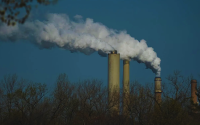30 January 2006The Independent
Tony Blair has admitted that the risks of climate change may be more serious than previously thought.
The Prime Minister's concern is revealed today in a book that contains compelling evidence from some of the world's leading scientists of the growing threat to the planet.
Reassessments of major risks to the Earth, such as the melting of the great land-based ice sheets of Greenland and Antarctica, which would raise sea levels disastrously, or the slowing down of the Gulf Stream, which would plunge Britain into a new ice age, show that they may be triggered by temperature rises well within those already predicted for the coming century.
The fresh appraisals indicate that the situation is far more dangerous than that set out in the last report of the main scientific body monitoring global warming, the United Nations Intergovernmental Panel on Climate Change (IPCC). That study, the IPCC's third assessment report, known to scientists as the TAR, said there was "new and stronger evidence" that much of the warming already observed in recent decades had been caused by human activities, such as the emission of carbon dioxide (CO2) and other greenhouse gases from power stations and motor vehicles. Most ominously, it predicted a global mean temperature rise of between 1.6C and 5.8C by the end of the century.
However, the TAR was published in 2001, which with climate change is now a relatively long time ago - both in terms of the understanding of the science of global warming, and of the speed with which climate-related events, such as extreme heatwaves and the melting of the Arctic sea ice, now seem to be occurring.
The next IPCC study, the fourth assessment report, is not due until 2007. So in the meantime, the British Government has sponsored a project to bring the science of global warming up to date, taking in all the latest developments, based on a conference held at the headquarters of the UK Meteorological Office in Exeter last year.
Today the records of the conference are being published in a book entitled Avoiding Dangerous Climate Change - and Tony Blair says in the foreword: "It is clear from the work presented that the risks of climate change may well be greater than we thought."
The book publishes the Exeter conference's remarkable and menacing findings. These included the unexpected announcement from the head of the British Antarctic Survey, Professor Chris Rapley, that the huge West Antarctic Ice Sheet may be starting to disintegrate - an event which alone would raise sea levels around the world by 16ft.
The last IPCC report - the TAR - dismissed worries about the ice sheet's stability. Professor Rapley, reporting that ice was now flowing into the sea from it at enormous rates, said that that judgement had to be revised. "The last IPCC report characterised Antarctica as a slumbering giant in terms of climate change," he said. "I would say it is now an awakened giant. There is real concern."
Another new concern raised at the conference was the acidification of the oceans, caused by the same greenhouse gas responsible for global warming. The huge volumes of carbon dioxide produced by industry and transport are not only raising temperatures, but turning the world's oceans acid as the CO2 is dissolved in seawater, and putting an enormous array of marine life at risk. Ocean acidification may wipe out much of the microscopic plankton at the base of the marine food web, and have a knock-on effect up through shellfish to major human food species such as cod. It is already having a serious impact on organisms such as coral, and putting a question-mark against the future of coral reefs.
The Exeter conference report itself makes no bones about the seriousness of the situation. It says: "Compared with the TAR, there is greater clarity and reduced uncertainty about the impacts of climate change across a wide range of systems, sectors and societies. In many cases the risks are more serious than previously thought." It goes on: "A number of critical temperature levels and rates of change relative to pre-industrial times were noted. These vary for the globe, specific regions and sensitive ecosystems. For example a regional increase above present levels of 2.7C may be a threshold that triggers melting of the Greenland ice-cap, while an increase in global temperatures of about 1C is likely to lead to extensive coral bleaching.
It warned of increasing damage if temperatures rose about 1C to 3C above current levels. Serious risk of large-scale irreversible system disruption, such as reversal of the land carbon sink and possible destabilisation of the Antarctic ice sheets, is more likely above 3C. "Such levels are well within the range of climate change projections for the century."
Referring to the possible collapse of the Gulf Stream, the report says: "While a clear temperature threshold has not been identified for shutdown of the Atlantic thermohaline circulation, studies were presented suggesting that a shutdown becomes more likely with increasing temperature."






